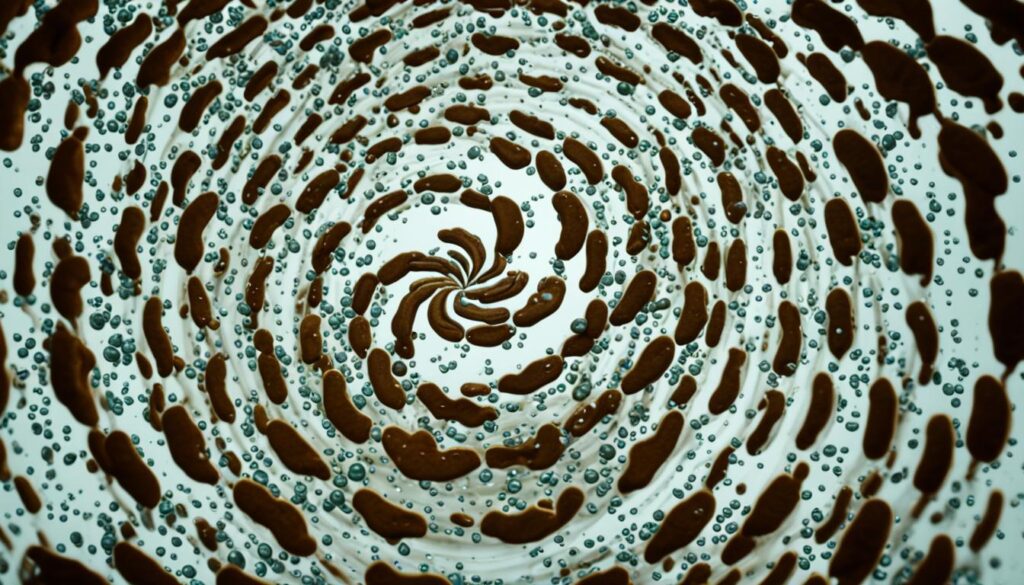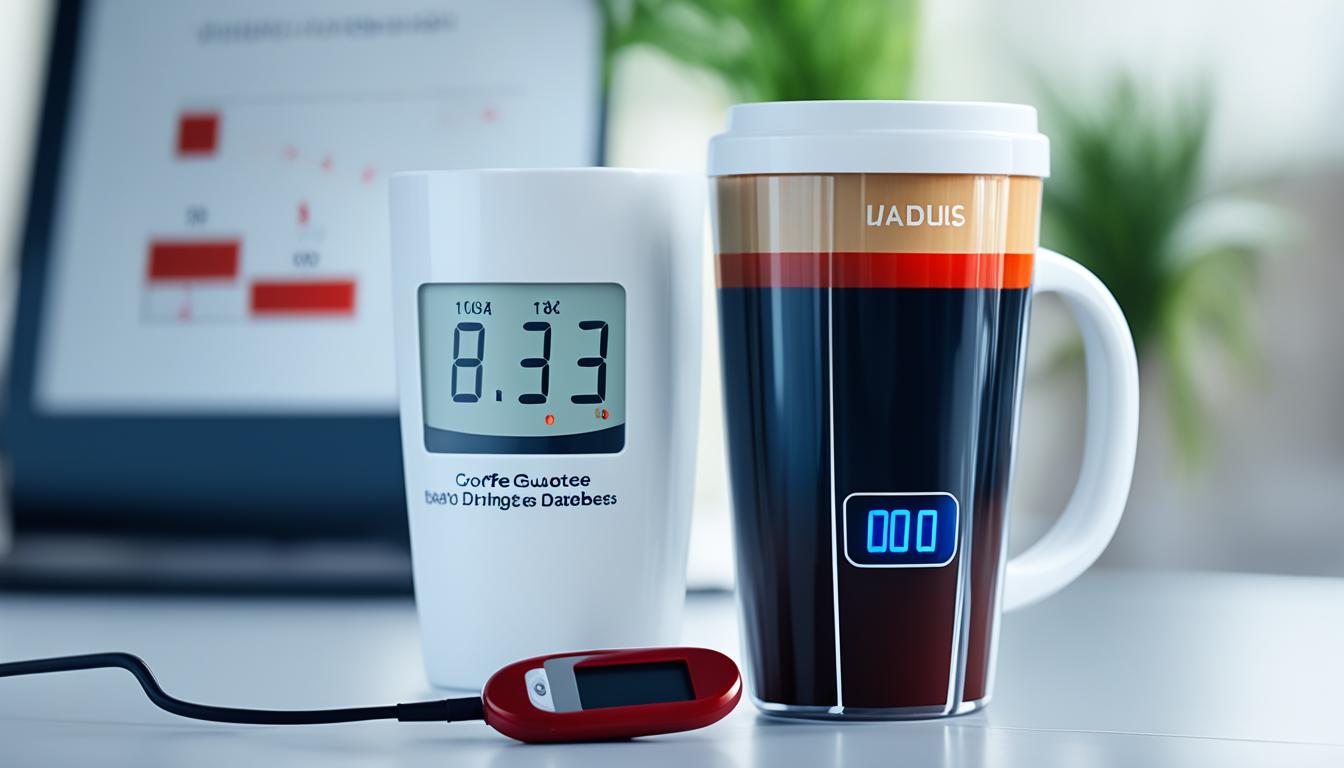Welcome to our article on the fascinating relationship between coffee and digestive health. Coffee is one of the most beloved beverages worldwide, with millions of people starting their day with a cup of joe. But have you ever wondered how coffee affects your digestion? In this article, we’ll explore the various ways coffee can impact your digestive system and shed light on its potential benefits and drawbacks.
Key Takeaways:
- Coffee can have a natural laxative effect, promoting bowel movements for some individuals.
- The exact reason behind coffee’s laxative effect is still unclear, but factors like colon stimulation and increased gastrin levels may contribute.
- Some people may experience bloating after drinking coffee due to its acidity and the presence of certain compounds.
- Certain individuals may also experience acid reflux symptoms, such as heartburn, after consuming coffee.
- While coffee has both positive and negative effects on digestion, it’s important to listen to your body and make adjustments to your consumption if necessary.
Coffee and Bloating: Understanding the Connection
Some individuals may experience bloating after drinking coffee. It’s believed that the acidity of coffee and the presence of certain compounds like chlorogenic acid can potentially irritate the digestive tract and contribute to bloating. The effects of coffee on bloating can vary from person to person, and some individuals may be more sensitive to these effects than others.
It’s important to listen to your body and make adjustments to your coffee consumption if necessary. If you notice bloating after drinking coffee, you may want to try the following:
- Choose a lower-acid coffee: Opting for a coffee with lower acidity levels may help reduce the potential for bloating.
- Limit your coffee intake: Cut back on the amount of coffee you drink and see if that alleviates bloating symptoms.
- Consider alternative brewing methods: Certain brewing methods, such as cold brew or using a French press, can result in a coffee with lower acid levels.
- Try decaffeinated coffee: Caffeine may exacerbate bloating symptoms for some individuals, so switching to decaf coffee could be worth considering.
By making these adjustments, you can determine if coffee is the cause of your bloating and find a solution that works best for you. It’s essential to remember that everyone’s digestive system is different, and what works for one person may not work for another.
Incorporating Probiotics
In addition to making adjustments to your coffee consumption, it may also be beneficial to incorporate probiotics into your daily routine. Probiotics are beneficial bacteria that can support a healthy gut and may help alleviate digestive issues such as bloating.
You can find probiotics in fermented foods like yogurt, kefir, sauerkraut, and kimchi. Alternatively, you can also take probiotic supplements, which are readily available over-the-counter.
| Food | Probiotic Strains |
|---|---|
| Yogurt | Lactobacillus acidophilus, Bifidobacterium lactis |
| Kefir | Lactobacillus kefiri, Bifidobacterium longum |
| Sauerkraut | Lactobacillus plantarum, Leuconostoc mesenteroides |
| Kimchi | Lactobacillus brevis, Lactobacillus kimchii |
Remember to consult with a healthcare professional before making any significant changes to your diet or starting any new supplements.
Coffee and Acid Reflux: What You Need to Know
Coffee has been known to trigger acid reflux symptoms in some individuals. The acidic nature of coffee can contribute to the relaxation of the lower esophageal sphincter, allowing stomach acid to flow back up into the esophagus. This can lead to symptoms like heartburn, chest pain, and a sour taste in the mouth.
If you experience acid reflux or gastroesophageal reflux disease (GERD), it may be beneficial to limit or avoid coffee consumption, especially on an empty stomach. The high acidity of coffee can exacerbate reflux symptoms and make them more frequent or severe. While the effects of coffee on acid reflux can vary from person to person, it’s important to pay attention to how your body reacts and make adjustments to your diet and lifestyle accordingly.
“The acidic nature of coffee can contribute to the relaxation of the lower esophageal sphincter, allowing stomach acid to flow back up into the esophagus.”
In addition to the acidic nature of coffee, the presence of other compounds like caffeine and chlorogenic acid can also play a role in triggering acid reflux symptoms. Caffeine is a known reflux trigger as it stimulates the production of stomach acid, while chlorogenic acid has been shown to relax the lower esophageal sphincter, further increasing the risk of reflux.
If you’re a coffee lover and still want to enjoy your favorite beverage without exacerbating your acid reflux, there are a few things you can try:
- Opt for low-acid coffee varieties or decaffeinated coffee
- Consider adding a non-dairy milk or almond milk to your coffee to neutralize the acidity
- Drink coffee in moderation, and avoid drinking it on an empty stomach
- Pair your coffee with a small snack or meal to help reduce the risk of reflux
- Listen to your body and make note of any triggers or patterns in your reflux symptoms
Remember, everyone’s body is different, and what works for one person may not work for another. If you’re unsure about how coffee may be affecting your acid reflux or GERD, it’s always a good idea to consult with a healthcare professional for personalized advice.
Foods and Beverages That Can Help Alleviate Acid Reflux Symptoms
| Food/Beverage | Potential Benefits |
|---|---|
| Ginger tea | Can help soothe the digestive system and reduce inflammation |
| Non-citrus fruits (e.g., bananas, melons) | Provide vitamins and nutrients without increasing acid production |
| Oatmeal | Low in acidity and high in fiber, can help absorb stomach acid |
| Almond milk | Low in acidity, can help neutralize stomach acid |
| Vegetables (e.g., broccoli, kale) | Provide essential nutrients and are low in acidity |
| Whole grains (e.g., brown rice, quinoa) | High in fiber and can help absorb stomach acid |
While coffee may be a trigger for acid reflux symptoms, there are still ways to enjoy a good cup of coffee without causing discomfort. Experiment with different options and find what works best for you.

The Surprising Benefits of Coffee for Digestive Health
While coffee has been associated with certain negative effects on digestive health, such as bloating and acid reflux, it also offers several surprising benefits for the digestive system. The key lies in understanding how coffee affects our gut health and its role in promoting regular bowel movements.
Promoting Regular Bowel Movements
One of the most notable benefits of coffee for digestion is its ability to stimulate the motor activity of the colon, which can help promote regular bowel movements and prevent constipation. The natural laxative effect of coffee is not solely attributed to its caffeine content, as even decaffeinated coffee can have a similar effect. Researchers believe that other compounds in coffee, such as chlorogenic acid, play a role in stimulating bowel movements.
The precise mechanism behind coffee’s laxative effect is not yet fully understood, but studies have suggested that it may increase the release of gastrin, a hormone that plays a vital role in regulating stomach acid production and gut mobility.
Improving Gut Health
Additionally, coffee has shown potential for improving overall gut health. Some research suggests that coffee, particularly with the presence of chlorogenic acid, serves as a prebiotic, providing nourishment to beneficial gut bacteria. This can help promote a healthy gut microbiome, which is essential for optimal digestion and overall well-being.
It’s important to note that individual responses to coffee may vary. While some individuals may experience these positive effects on digestion, others may not notice any significant changes. Paying attention to your body’s signals and making adjustments to your coffee consumption accordingly can help you determine what works best for you.
| Positive Effects of Coffee on Digestive Health | Negative Effects of Coffee on Digestive Health |
|---|---|
| – Stimulation of colon motor activity | – Potential for bloating |
| – Promotion of regular bowel movements | – Association with acid reflux symptoms |
| – Possible improvement in gut microbiome |
Overall, while some negative effects of coffee on digestive health exist, it’s important to highlight the potential benefits it can offer. Regular bowel movements, improved gut health, and the presence of chlorogenic acid as a prebiotic are all reasons to consider incorporating coffee into your diet, if it aligns well with your individual needs and tolerability.
Conclusion
Coffee’s impact on digestive health is a complex topic, with both pros and cons to consider. For some individuals, coffee can be a beneficial addition to their daily routine, promoting regularity and improving gut health. The natural laxative effect of coffee can stimulate bowel movements, helping to prevent constipation and promote overall digestive wellness.
However, it’s important to note that coffee may not have the same positive effects for everyone. Some individuals may experience bloating and discomfort after consuming coffee due to its acidity and certain compounds that can irritate the digestive tract. Additionally, coffee can trigger acid reflux symptoms in individuals with conditions like GERD.
When it comes to coffee and digestive health, moderation and listening to your body’s signals are key. It’s important to pay attention to how your body responds to coffee and make adjustments to your consumption if necessary. If you have any concerns or pre-existing digestive conditions, consulting with a healthcare professional is always a wise choice.
In summary, while coffee can provide benefits for digestive health, it’s important to weigh the pros and cons and make choices that align with your individual needs. Whether you choose to enjoy a cup of coffee for its potential gut wellness benefits or decide to limit your consumption due to bloating or acid reflux symptoms, being mindful and attuned to your body is essential when it comes to maintaining a healthy digestive system.
FAQ
Does coffee have a natural laxative effect?
Yes, coffee has a natural laxative effect and can promote bowel movements. This effect is not just due to caffeine, as decaffeinated coffee can have the same impact. The exact reason for coffee’s laxative effect is still unclear, but it may be due to a combination of factors including the stimulation of the motor function of the colon and increased gastrin levels.
Can coffee cause bloating?
Yes, some individuals may experience bloating after drinking coffee. The acidity of coffee and the presence of certain compounds like chlorogenic acid can potentially irritate the digestive tract and contribute to bloating. It’s important to note that the effects of coffee on bloating can vary from person to person, and some individuals may be more sensitive to these effects than others.
Does coffee trigger acid reflux?
Coffee can trigger acid reflux symptoms in some individuals. The acidic nature of coffee can contribute to the relaxation of the lower esophageal sphincter, allowing stomach acid to flow back up into the esophagus. This can lead to symptoms like heartburn, chest pain, and a sour taste in the mouth. If you experience acid reflux or GERD, it may be beneficial to limit or avoid coffee consumption, especially on an empty stomach.
Does coffee have any benefits for digestive health?
Yes, coffee offers several benefits for digestive health. The stimulation of the colon’s motor activity by coffee can promote regular bowel movements and help prevent constipation. Coffee has also been found to increase gastrin levels, which can improve overall gut health. Additionally, some research suggests that coffee can have a positive impact on the gut microbiome, particularly with the presence of chlorogenic acid that acts as a prebiotic for beneficial bacteria.
Should I be concerned about coffee’s impact on digestion?
Individual responses to coffee may vary. While it can have some negative effects on digestive health, such as bloating and acid reflux, it can also have benefits for others. It’s important to pay attention to your body’s response to coffee and make adjustments to your consumption if necessary. Moderation is key, and if you have concerns about how coffee may be affecting your digestive health, it’s always a good idea to consult with a healthcare professional.




